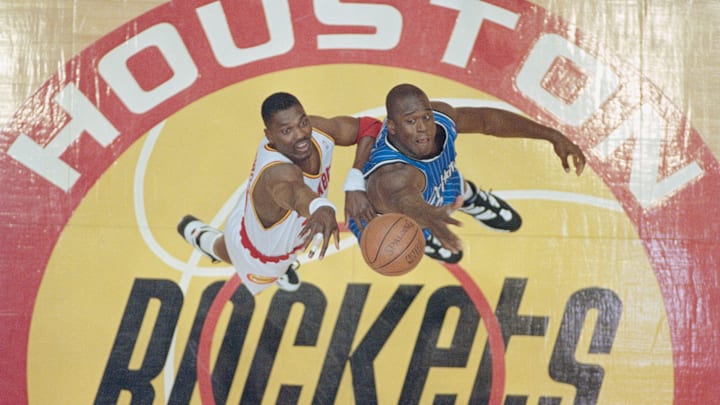The Houston Rockets have fans in Clutch City believing once again. Their last championship run, during the 1994-95 NBA season stands as one of the most remarkable in basketball history. Against all odds, the Rockets became the lowest-seeded team (6th seed) to win an NBA championship. Their resilience, bold moves and standout performances solidified their place in NBA lore. Led by head coach Rudy Tomjanovich and anchored by all-time great, Hakeem Olajuwon, the Rockets demonstrated that grit and determination are what champions are made of.
Houston Rockets 1994-95 squad
The ‘94-95 regular season was a rollercoaster ride for the Rockets. They finished with a 47-35 record, placing them third in the Midwest Division, making them the sixth seed in the Western Conference. This was a far cry from the dominance they displayed during the previous year’s title run. The Rockets definitely suffered from a bit of a championship hangover after the first title in ’93-94.
Coach Rudy T guided the team with an eye toward playoff success. A pivotal mid-season trade brought Clyde Drexler from Portland to reunite with former University of Houston teammate Olajuwon. While Drexler had been in the NBA for over a decade, he was still averaging 22 ppg when he was traded to the Rockets.
Drexler’s arrival gave the Rockets a boost of energy, particularly in scoring and leadership. Despite taking a step (or two) back from their previous championship campaign, Houston’s roster was built for the postseason and the team’s chemistry began to click at just the right time.
Key Players and contributions
Hakeem “the Dream” Olajuwon was the heart and soul of this Rockets squad. His dominance on both ends of the court was unmatched, and his postseason performance is what cemented his place among the NBA’s all-time greats. During the ‘94-95 regular season, Olajuwon averaged 27.8 points, 10.8 rebounds, 3.5 assists, 1.8 steals, and 3.4 blocks per game. His footwork in the post, famously dubbed “The Dream Shake,” was smooth enough to leave the best NBA Centers baffled defensively.
Joining the team mid-season, Drexler seamlessly integrated into the lineup. Drexler averaged 21.4 points, 7 rebounds, 4.4 assists, and 1.8 steals in 35 regular season games with the Rockets. His ability to slash to the basket, hit outside shots and defend added a new layer of versatility to the team.
Houston’s supporting cast played a vital role in their success. Robert Horry, known for his clutch shooting, provided 10.2 points and 5.1 rebounds per game while hitting key shots throughout the run. Point guard, Kenny Smith, averaged 10.8 points and kept the offense flowing. Meanwhile, Mario Elie, Sam Cassell, Vernon Maxwell, and Otis Thorpe contributed timely scoring, rebounding and defensive energy, giving the Rockets depth that many teams lacked.
Rockets team depth
What made the Rockets so dangerous was their balance of veteran leadership and young talent. They weren’t the flashiest team, but they were efficient. Houston ranked 7th in offensive rating (110.4) and 12th in defensive rating (108.1) during the regular season. Their ability to adapt and execute game plans was crucial as they faced higher-seeded opponents throughout the playoffs.
Tomjanovich’s strategy emphasized spacing, ball movement, and defensive consistency. By surrounding Olajuwon with capable shooters and defenders, Houston maximized their superstar’s impact. The team relied on its ability to stay composed under pressure and the experience of having gone all the way during the ’94 playoffs.
A historic playoff run
H-Town’s playoff journey in ‘95 was nothing short of legendary. They faced elimination multiple times but showed an uncanny ability to rally back.
First Round: Utah Jazz
The Rockets edged out the Utah Jazz in a five-game series. Facing a 2-1 deficit, Olajuwon dominated the final two games, helping Houston advance.
Western Conference Semifinals: Phoenix Suns
Perhaps the most dramatic series of their run, the Rockets fell behind 3-1 against a formidable Suns team led by Charles Barkley. They stormed back to win three straight games, capped by a thrilling one-point Game 7 victory in Phoenix.
Western Conference Finals: San Antonio Spurs
Matched up against MVP David Robinson and the Spurs, the Rockets won in six games. Olajuwon thoroughly outplayed Robinson, showing it didn’t matter who’d won the MVP award that year.
NBA Finals: Orlando Magic
Facing a young and talented Orlando Magic team featuring Shaquille O’Neal and Anfernee “Penny” Hardaway, the Rockets swept the series 4-0. Houston’s experience and confidence under pressure proved too much for the Magic to handle.
Hakeem Olajuwon: NBA Finals MVP
In the Finals, Olajuwon was unstoppable. He averaged 32.7 points and 14.2 rebounds per game earning his second consecutive Finals MVP award. His ability to neutralize O’Neal and dominate offensively was the defining factor in Houston’s championship sweep.
